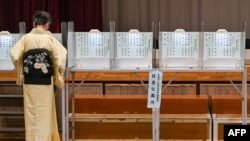Japan faced a period of political instability on Monday after its longtime ruling party suffered its worst election performance in 15 years, leaving Prime Minister Shigeru Ishiba under pressure to resign and casting doubt on the makeup of the next government.
Sunday’s vote saw the Liberal Democratic Party (LDP) and its junior coalition partner, Komeito, fail to secure a majority in the country’s powerful lower house, setting off a scramble to find smaller partners to form a government within 30 days.
Ishiba, who became prime minister just last month, had hoped the election would solidify his leadership amid public outrage over a political funding scandal and rising living costs. Instead, his gamble backfired.
The ruling coalition won just 215 seats, far short of the 233 needed for a majority. For the LDP, which has dominated Japan’s post-war politics, it was the worst showing since 2009, when the party lost power for four years.
“The result is that the Japanese political system is indeed entering a new and uncertain period,” said Tobias Harris, founder of Japan Foresight, a political risk advisory company.
No easy path forward
Despite major gains, the opposition – ranging from Communists to far-right groups – is seen as too divided to form a government. Many opposition parties have also ruled out joining a coalition with the LDP and Komeito, further complicating the path forward.
Some analysts predict the LDP and Komeito may try to form a minority government, relying on smaller, center-right parties like the Democratic Party for the People and the Innovation Party, to pass legislation on a case-by-case basis.
However, such an arrangement would not be “particularly stable” and would be vulnerable to collapse if it fails to meet opposition demands, Harris wrote in a blog post.
Another question is the fate of Ishiba himself. Just last month, Ishiba emerged victorious over his more conservative rivals within the LDP, including those loyal to the late prime minister and conservative icon Shinzo Abe.
But the election result has weakened both Ishiba and the Abe faction, with many of Abe’s allies losing their seats after being implicated in the slush fund scandal.
Though Ishiba has expressed eagerness to form a new government, analysts are divided on how long he can last as head of the LDP, especially with a difficult upper house election approaching in July.
For now, Abe’s allies may be happy to let Ishiba deal with the consequences of this week’s defeat.
“It’s going to be a messy situation for months,” said James DJ Brown, a political science professor at Temple University Japan.
“In a way, it’s better for them to wait…then later on, at a moment of their choosing, push him aside and take power,” he added.
Foreign policy challenges
Despite the domestic upheaval, Japan’s foreign policy is not expected to undergo major changes, though some priorities may shift.
Ishiba, a former defense minister, had embraced several controversial proposals, such as forming an Asian version of NATO and a nuclear-sharing arrangement with the United States.
However, his weakened position means these plans are unlikely to gain traction. Instead, if he survives, Ishiba will likely focus on areas with broader political consensus, analysts say.
“There will be no big change on foreign policy. But obviously because of the outcome of this election, foreign policy will never be a top priority for the new government,” said Tetsuo Kotani, a professor of global studies at Meikai University in Chiba, Japan.
This could raise concerns as Japan faces growing threats from North Korea, pressure from China, and uncertainty over the U.S. presidential election.
Tomohiko Taniguchi, a former Abe advisor, noted that while the U.S.-Japan alliance remains a priority, many opposition parties are less interested in boosting Japan’s military capabilities.
“They’re not interested as much in raising tax revenue to help support the growing necessity for Japan to rearm itself more fundamentally,” said Taniguchi.
A weakened Japanese prime minister could also struggle to negotiate with Donald Trump, should he win the U.S. presidential election next month, Taniguchi warned.
“To deal successfully with Mr. Trump, you need to be strong, you need to be well endowed with your political capital. And that's the thing that the Japanese leader – Ishiba, whoever – cannot show and cannot have.”
